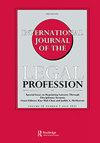Women and judicial appointments
IF 0.9
Q2 LAW
International Journal of the Legal Profession
Pub Date : 2020-05-03
DOI:10.1080/09695958.2020.1794513
引用次数: 3
Abstract
The six papers in this special issue deal with various aspects of women in the judiciary in six different countries: two contributions are from sub-Saharan Africa: South Africa and Nigeria, two from Europe: Northern Ireland and Spain and two from very different parts of Asia: Turkey and the Philippines. The papers on Africa and Europe have been presented at an Expert Seminar on Gender and the Judiciary organised by Tabeth Masengu under the auspices of the Human Rights Centre at Ghent University in Belgium on the 27th of April 2018. The two papers on Asia have been developed in the context of a project on Women Judges in Muslim Courts of Law which was an International Research Collaborative for the international socio-legal meeting in Mexico-City in 2017. Adding new countries, this special issue of the International Journal of the Legal Profession complements other international comparative collections on gender issues in the judiciary which have been published in the past years. These include the comprehensive volume with 30 contributions on 19 countries “Gender and Judging” (Schultz and Shaw 2013a), two special issues of the International Journal of the Legal Profession “Women in the Judiciary” (Schultz and Shaw 2012), and “Gender and Judicial Education” (Schultz et al. 2016); and a collection on “Women Judges in the Muslim World” (Lindbekk and Sonneveld 2017) as well as an upcoming issue of the Onati Socio-Legal Online Series on Gender in Muslim courts of Law. National publications are innumerable and still new research projects on related issues are launched, e.g. at the University of Bergen/ Norway on “Women on the Bench. The Role of Female Judges in Fragile States”. Also documentary films on women judges have been produced: e.g. on Ruth Bader Ginsberg, the feminist judge at the American Supreme Court, “RBG” and “On the Basis of Sex” (both 2018), “The Judge” (2018) about the first female Sharía Court judge in Palestine, “Lady Judges in Pakistan” (2013) by Livia and Marius Holden, “Courting Justice” (2010) by Ruth Cowan about Women Judges in South Africa after Apartheid, “Sisters in Law” (2005) about women judges in Kameron. A broad range of subjects related to women in the judiciary are covered in all the mentioned publications. These include topics such as access and careers in the judiciary, dealing with the question: Do women have equal chances in the judiciary, do they have equal representation in higher positions or do they hit the famous glass ceiling? Are they accepted by their colleagues and by clients at court, male and female clients? Is there indecent behaviour and/or discrimination against female judges? Is it easy or particularly difficult for women in the judiciary to find a work/family-life balance? What are impeding factors? What are the prevailing gender images in their societies? Is there a relation between participation of women in the judiciary and prestige and pay? Do women judge differently? In what way may gender, age, marital-parental status, position and race/ethnicity influence their decision making (and of course that of their male counterparts)? Can class or other differences in background create a divide between the elite women judges and the “ordinary” women taking their cases to court? Do women judges have a more caring attitude to clients? What are the expectations from people at court towards female judges?妇女和司法任命
本期特刊的六篇论文涉及六个不同国家司法部门妇女的各个方面:两篇来自撒哈拉以南非洲:南非和尼日利亚,两篇来自欧洲:北爱尔兰和西班牙,两篇来自亚洲非常不同的地区:土耳其和菲律宾。关于非洲和欧洲的论文已于2018年4月27日在比利时根特大学人权中心主持下由Tabeth Masengu组织的性别与司法专家研讨会上发表。这两篇关于亚洲的论文是在“穆斯林法院的女法官”项目的背景下编写的,该项目是2017年墨西哥城国际社会法律会议的国际研究合作项目。加上新的国家,本期《国际法律专业杂志》特刊补充了过去几年出版的关于司法中性别问题的其他国际比较文集。其中包括涵盖19个国家的30篇文章的综合卷《性别与审判》(Schultz and Shaw 2013),《国际法律专业杂志》的两期特刊《司法中的女性》(Schultz and Shaw 2012)和《性别与司法教育》(Schultz et al. 2016);以及一本关于“穆斯林世界的女法官”的合集(Lindbekk and Sonneveld 2017),以及即将出版的关于穆斯林法院性别的Onati社会法律在线系列。国家出版物数不胜数,而且还开展了有关问题的新研究项目,例如在卑尔根大学/挪威开展了关于“法官上的妇女”的研究项目。脆弱国家中女法官的作用”。也制作了关于女法官的纪录片:例如,在美国最高法院的女权主义法官Ruth Bader Ginsberg,“RBG”和“基于性别”(2018年),“法官”(2018年)关于巴勒斯坦第一位女性Sharía法院法官,“巴基斯坦女法官”(2013年)由Livia和Marius Holden,“追求正义”(2010年)由Ruth Cowan关于种族隔离后南非的女法官,“姐夫”(2005年)关于喀麦隆女法官。上述所有出版物都涉及与司法部门妇女有关的广泛问题。其中包括司法部门的机会和职业等主题,涉及的问题是:女性在司法部门是否有平等的机会,她们在更高的职位上是否有平等的代表性,或者她们是否遇到了著名的玻璃天花板?她们在法庭上是否被同事和客户所接受,无论男女?是否有不雅行为及/或歧视女法官?司法部门的女性在工作和家庭生活之间找到平衡是容易还是特别困难?阻碍因素是什么?在他们的社会中,主流的性别形象是什么?妇女参与司法与声望和薪酬之间是否存在关系?女性的判断不同吗?性别、年龄、婚姻父母状况、职位和种族/民族会以何种方式影响他们的决策(当然还有他们的男性同行)?阶级或其他背景上的差异会在精英女法官和“普通”女法官之间造成隔阂吗?女法官对客户是否有更关心的态度?法庭上的人对女法官的期望是什么?
本文章由计算机程序翻译,如有差异,请以英文原文为准。
求助全文
约1分钟内获得全文
求助全文

 求助内容:
求助内容: 应助结果提醒方式:
应助结果提醒方式:


